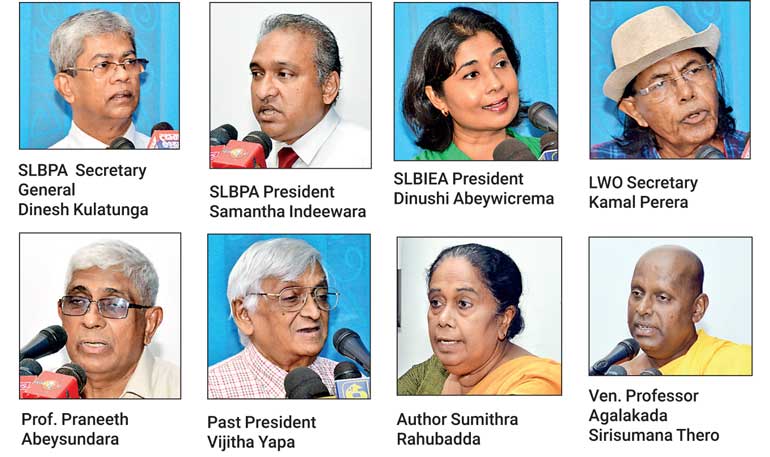Wednesday Feb 18, 2026
Wednesday Feb 18, 2026
Saturday, 3 February 2024 01:55 - - {{hitsCtrl.values.hits}}

The country’s book industry yesterday called upon President Ranil Wickremesinghe to immediately cancel the prohibitive 18% Value Added Tax (VAT) to avert long-term consequences of making books more expensive for the masses.
Given the seriousness of the situation, local book publishers, printers, book importers, authors as well as academics and stakeholders yesterday came together to voice their opposition to the unavoidable hike in the prices of books consequent to the imposition of VAT, pointing to the pernicious long-term effects it would have on socio-economic development by making access to knowledge unaffordable to many.
Previously books weren’t subject to VAT.
“We acknowledge that economic challenges spanning multiple Government terms have led to a situation where the broader population has been required to shoulder the financial implications of the gradual national recovery,” Sri Lanka Book Publishers Association (SLBPA) General Secretary Dinesh Kulatunga told the media yesterday.
“But is it fair that this short-term requirement to boost Government revenue should have the longer-term destructive consequence of retarding the education, culture, intellectual progress and personal development of generations of Sri Lankans, and negatively impact the development of the knowledge economy?” he asked.
Speakers representing different stakeholder groups in the book industry also charged that with the indiscriminate extension of VAT to a highly sensitive and vulnerable sector like books, Sri Lanka was also in violation of the UNESCO Florence Agreement of 1950, to which the country was an early signatory and continues to be a Contracting State.
The UNESCO Florence Agreement is a treaty that binds Contracting States to not impose customs duties and taxes on certain educational, scientific, and cultural materials that are imported.
“With the imposition of VAT on books, Sri Lanka attains the dubious distinction of becoming one of a very few countries that impose a tax on a vital source of knowledge and information,” said Sri Lanka Book Publishers Association President Samantha Indeewara. “What this means is that while the rest of the world is trying to make knowledge more accessible and inclusive at the grassroots level, Sri Lanka is trying to use this industry to raise Government revenue, heedless of the serious ramifications.”
“It is a text-book case of killing the goose that lays the golden eggs.”
“According to the International Book Publishers Association, books are not a commodity like any other, but are strategic assets that activate the knowledge economy, facilitate upward social mobility as well as personal growth, and bring widespread medium and long term social, cultural and economic benefits.”
It was also pointed out that the industry already contributes over Rs. 1 billion to the Government’s tax revenue via the VAT paid by importers that supply 90% of the raw materials used in the production of school text books and other books. The imposition of VAT on books therefore results in an anomaly of double taxation for publishers, further aggravating a difficult situation.
Literary critic and Anthropologist, Prof. Praneeth Abeysundara said: “Even we academics who used to buy about 10 books per month earlier can now afford to purchase just one book if at all. The Government’s move will transform this country into one deficit of knowledge and literary aesthetics. Such a nation will merely breed a mentally dead populace if they make books inaccessible to the common man.
Sri Lanka’s decision to impose 18% VAT on books has already generated concern internationally, with the International Publishers Association (IPA) and the European and International Booksellers Federation (EIBF) writing to President Ranil Wickremesinghe to voice their objections.
“Our member associations are united and have made efforts to engage with your office to explain the catastrophic consequences that such a tariff will have on the country’s book sector,” the two organisations said on 15 December 2023. “We stand in solidarity with Sri Lankan publishers and booksellers, and urge you to reconsider this measure for the benefit of the Sri Lankan literary landscape.”
Among the Sri Lankan organisations and personalities that attended the news conference to call for the restoration of the VAT exemption on books were the Sri Lanka Book Publishers Association (SLBPA), the Sri Lanka Book Importers and Exporters Association, the Sri Lanka Writers Association, and several leading writers, academics, educationists and author-publishers.